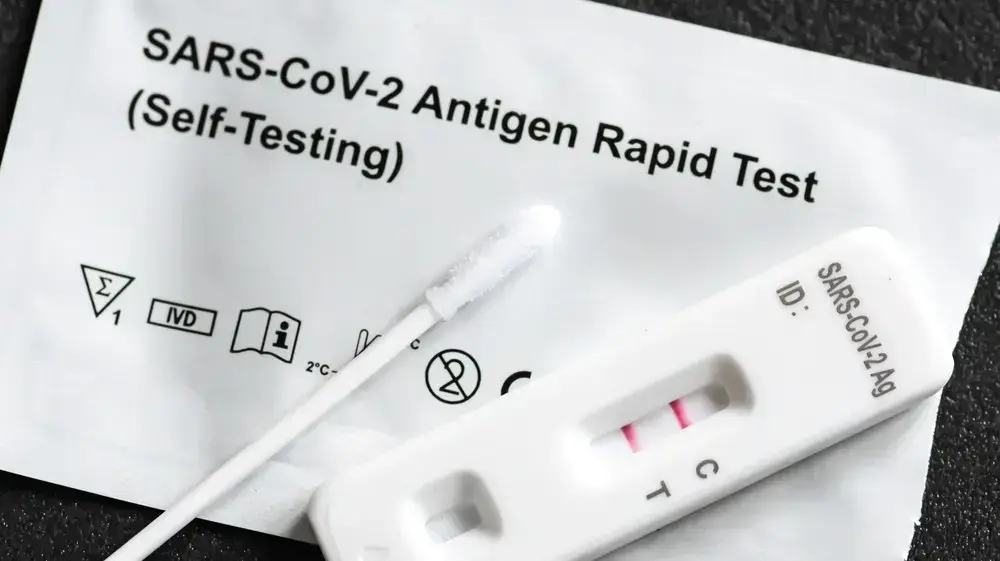In the second summer of the pandemic, the focus is again on risks from holidaymakers who come home from all over the world.
The government is working on guidelines for more tests to detect infections.
Berlin - To protect against the spread of corona after the summer vacation, vacationers have to be prepared for extended test obligations when returning to Germany.
The federal government is currently voting on a planned new regulation, as a spokeswoman for the Ministry of Health said on Tuesday. Head of department Jens Spahn (CDU) and Interior Minister Horst Seehofer (CSU) are striving for a quick expansion of the testing obligations - but there are still discussions. The travel industry called on vacationers to get vaccinated. With a view to autumn, there should be another federal-state round on August 10th.
A general test obligation upon entry already exists for all flight passengers. Proof of a negative result must be made in the holiday country and presented before the start - or proof of a recovered or fully vaccinated person. According to Spahn and Seehofer's ideas, a test should in principle be required in the future. Regardless of where and with which means of transport you come - for example by car from neighboring countries.
Seehofer told the “Bild” newspaper (Wednesday): “We have to do everything we can to prevent a fourth wave. This also means that in the future, return travelers will have a negative corona test every time they enter the country. ”In private transport, this should be checked“ on a point-by-point basis as part of the veil search ”. There will be no stationary border controls. "Anyone who has been shown to have been vaccinated or recovered does not, of course, need a test."
The government's tourism commissioner, Thomas Bareiß (CDU), expressed criticism: "It cannot be that with increasing incidences the discussion about necessary measures is first carried out on the back of the travel industry and the vacationers." It is also incomprehensible that with increasing vaccination rates are predominantly referred to as tightening. He could imagine that obligations to provide evidence could be even more complete. However, this must clearly be accompanied by simplifications, for example with quarantine regulations.
Federal Justice Minister Christine Lambrecht (SPD) said: "We have to ensure that the infection process remains manageable." The government is working on a solution to revise the rules for return travelers. “Even if more and more people are benefiting from the protection of a vaccination, we shouldn't feel as though we were in a false sense of security.” Spahn had already spoken out in favor of extending the obligation to test last week. First, the newspapers of the Funke media group reported on the subject on Tuesday.
Criticism came from the opposition. Such a comprehensive expansion of the obligation to test is neither helpful in combating the pandemic nor proportionate, said the FDP health expert ChristineAschenberg-Dugnus. The focus should be on travelers from high risk and virus variant areas. The SPD health expert Karl Lauterbach supported compulsory testing for all not fully vaccinated or recovered. When traveling on vacation, there is a higher risk of getting infected because of the larger number of contacts - regardless of the travel location and means of transport, he told the “editorial network Germany” (Wednesday).
An amended entry regulation will come into effect this Wednesday. Since there was no agreement on the regulation planned by Spahn and Seehofer, the existing regulations will essentially be extended until September 10th. There is a relief for those arriving from virus variant areas in which worrying forms of the virus are circulating. So far, those who have recovered and who have been vaccinated who come back from there have to be in quarantine for 14 days. In future, this can generally be ended prematurely if the region is no longer classified as a virus variant area during the quarantine period.
The Robert Koch Institute (RKI) publishes on its website which regions the federal government declares as high-risk, high-incidence or virus variant areas with special requirements for tests and quarantine.
Since Tuesday, Spain and the Netherlands have been high incidence areas with a particularly high number of new infections.
Anyone who returns from such an area and is not fully vaccinated or recovered has to be in quarantine for ten days, but can shorten this with a negative test after five days.
The German Travel Association (DRV) and the Federal Association of the German Air Transport Industry (BDL) appealed to citizens to accept vaccination offers.
"For vaccinated people, travel planning is more reliable and traveling is easier." Some countries reserved certain local activities exclusively for vaccinated people.
The federal states want to discuss the further Corona procedure in a video conference with Chancellor Angela Merkel (CDU) on August 10th. This was announced by the chairman of the Prime Minister's Conference, Berlin's Governing Mayor Michael Müller (SPD). The next round was originally planned for the end of August. Müller said he would like the federal government to deal quickly with regulations for travelers returning. dpa













